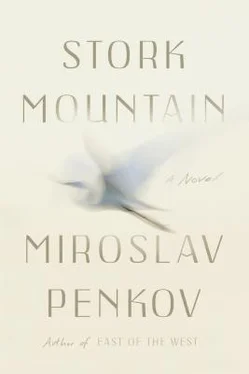Miroslav Penkov - Stork Mountain
Здесь есть возможность читать онлайн «Miroslav Penkov - Stork Mountain» весь текст электронной книги совершенно бесплатно (целиком полную версию без сокращений). В некоторых случаях можно слушать аудио, скачать через торрент в формате fb2 и присутствует краткое содержание. Год выпуска: 2016, Издательство: Farrar, Straus and Giroux, Жанр: Современная проза, на английском языке. Описание произведения, (предисловие) а так же отзывы посетителей доступны на портале библиотеки ЛибКат.
- Название:Stork Mountain
- Автор:
- Издательство:Farrar, Straus and Giroux
- Жанр:
- Год:2016
- ISBN:нет данных
- Рейтинг книги:4 / 5. Голосов: 1
-
Избранное:Добавить в избранное
- Отзывы:
-
Ваша оценка:
- 80
- 1
- 2
- 3
- 4
- 5
Stork Mountain: краткое содержание, описание и аннотация
Предлагаем к чтению аннотацию, описание, краткое содержание или предисловие (зависит от того, что написал сам автор книги «Stork Mountain»). Если вы не нашли необходимую информацию о книге — напишите в комментариях, мы постараемся отыскать её.
Stork Mountain — читать онлайн бесплатно полную книгу (весь текст) целиком
Ниже представлен текст книги, разбитый по страницам. Система сохранения места последней прочитанной страницы, позволяет с удобством читать онлайн бесплатно книгу «Stork Mountain», без необходимости каждый раз заново искать на чём Вы остановились. Поставьте закладку, и сможете в любой момент перейти на страницу, на которой закончили чтение.
Интервал:
Закладка:
“Let me guess,” Grandpa told him, “your girls are burning with the nestinari fever?”
The man’s eyes turned to saucers. “I know,” Grandpa told him, “because for two weeks now, like a circus bear, I’ve been parading among the houses of sick girls. And not one of them is really burning and they’re all acting.”
But this old grandma, the man stuttered, this old Christian woman had seen his daughters and she’d recognized in their eyes Saint Kosta’s fever. “This old Christian woman,” Grandpa answered, “is sad and senile. She knows nothing of Saint Kosta.”
“But you do, teacher,” the man said. “That’s why I’ve come to get you.”
Grandpa asked the man if he’d called a proper doctor to examine his daughters and the man told him he didn’t trust proper doctors. Not since they’d let his wife die in childbirth, in the town hospital at that.
“I’m sorry, kardash ,” Grandpa told him. “I can’t help you.”
The man watched him, stunned. He shook his head. He wasn’t leaving.
“That’s fine by me,” Grandpa said, then returned to the bench and pretended to read his paper.
“Teacher, if it were for my sake, I wouldn’t be asking you again. But it’s for my girls I’m begging. If you too are a father—”
Right about here, Grandpa’s fuse blew a little. It had been months since he’d last heard from me and who knew if he’d ever hear my voice again. So he shouted. He asked the man what he knew about him being a father and this and that, and overall he brought much shame to our name that day.
The man said nothing in response. He left the yard like a clobbered dog, a trail of muddy water in the dust behind him. A week later, Grandpa heard, his girls died.
* * *
I had returned to Grandpa’s room still dazed from my kiss with Elif — no, two kisses! — to find him stretched in bed, his eyes closed and arms folded across his chest. “I don’t feel well,” he said, without looking. He’d taken some pills already, but could I please measure his blood pressure? I did. The reading was alarmingly high. So I told him to lie still and let the pills work their magic.
“I worked myself into a fury, my boy. I said things I shouldn’t have.”
“You think?”
For a while we listened to what had eased into a drizzle outside.
“I don’t care what its nationality is,” Grandpa said to break the silence. “This rain depresses me to no end and gets my tongue wild.”
“You think?” I said, and was this close to apologizing, for I too had said things I shouldn’t have. Instead, I went to change into dry clothes and back in his room I took his blood pressure again. Lower, but still in the danger zone.
“What you said to Elif,” I asked, “about her hurting me to get to her father, about her father hurting her to get to you. Do you believe it?”
“It doesn’t matter what I believe. I’ve been wrong more often than I care to remember.”
I listened quietly, not daring to interrupt, while he told me the story of the sick girls and of their father.
“To this day,” he said in the end, “I’m convinced I could have saved them. If only I’d gone to their hut. I would have recognized the fever.”
I knew I should spare him the questions, wait until tomorrow when he felt better. And yet I couldn’t help it. “The nestinari fever?”
He blinked a moment, munching on some invisible seeds. Then he pushed himself upright and, amid the creaking of the bedsprings, spoke: “Take the meter. I want to show you something.”
FIVE
THE CLASSROOM SMELLED SWEET, like aging books. And musty — like feet, rubber galoshes, socks that had somehow remained wet for many years. And rotting wood, and straw, and mouse urine — at least that’s what Grandpa said mouse urine smelled like. I’d come down to the first floor only once before; there was nothing for me to see here besides three rows of little desks, a larger one up front for the teacher, tilted to one side with a broken leg, an ancient stove, a blackboard with individual letters still legible under the dust, and books — piles and piles like old, crooked prisoners lined up against one wall awaiting their execution.
It goes without saying that with each new book Grandpa slammed on the tiny desk before me, I sneezed. He’d collected them, one by one from the piles, with the ease of a masterful librarian. At last, he lowered himself on the chair beside me — the two of us little schoolboys ready for a lesson.
“Now take my blood pressure again,” he said, and I did, a third time.
It was better, but there was still room for improvement. He nodded. “Let’s start with some light reading, then,” and he untied the red strings that held shut the folder before us. Dust rose, bitter like medicine.
“‘Man on the Moon,’” Grandpa read, taking out a newspaper clipping. “One giant leap for mankind, one tiny article in a Communist paper. ‘The Bones of Tsar Kaloyan Unearthed.’ ‘The Oldest European Gold Treasure Dug Up in Varna’ … Here, read this.”
“‘May 1988,’” I read from a page with torn edges. “‘A Fainting Epidemic in Tanzania.’” Twenty children in a school in Tabora, while taking their final-year exams, had all been stricken by a fit of mass fainting — a common occurrence for Tanzania, the article assured. There had been a great deal of crying and screaming and running while the exam unfolded, and then the fainting fits had come.
Grandpa fished out another clipping. This one from October 1983. “A Fainting Epidemic in the West Bank.”
“Creative titles,” I said, and he sneered. In March 1983, the article read, more than nine hundred Palestinian schoolgirls and a handful of women soldiers from the Israel Defense Forces had fainted in the West Bank. A subsequent Palestinian investigation had determined that while some instances could have been the result of an Israeli chemical agent, the majority of the cases had been purely psychosomatic in nature.
“Purely psychosomatic,” Grandpa said, and traced the line with his finger for emphasis.
He waved another clipping in my face and I sneezed once more in his. “‘A Laughter Epidemic in Tanganyika.’ January 1962. Mass hysteria at a mission-run boarding school for girls in Kashasha.” The fit of laughter had started with three girls and before sunset it had affected two-thirds of all students and not a single teacher. By March the school was closed down, the students shipped home and with them the epidemic. More schools, more girls, thousands of people — all laughing. And with the laughter pain, fainting, flatulence — Grandpa tapped the word with his crooked finger — respiratory problems, rashes, attacks of crying, random screaming.
“In Tanganyika?” I repeated, and — God help me, because I couldn’t — burst out laughing.
I could see he too was fighting. To no avail. Soon we laughed together, unreasonably long, and for a moment I felt as if I would burst at my seams and all the troubles that were crushing me like stones — Elif, Orhan, the sick little girl, my sick grandfather, my student loans — would roll away and I’d be free. “We’re doomed,” I cried. “To flatulence and random sneezing.”
“The sneezing plague of Klisura,” Grandpa said, and wiped the tears in his eyes. “Saint Kosta help us!”
He closed the folder and we both gasped for air.
“Now then,” he said when we had calmed down a little, and opened a book. What caught my attention right away was an illustration — or rather a reproduction of a medieval engraving — of men and women, in what I’d say was Bavarian attire, their bodies twisted in odd, unnatural positions, their faces contorted: eyes popping, tongues sticking out, and locks of hair spilling in all directions like fire.
Читать дальшеИнтервал:
Закладка:
Похожие книги на «Stork Mountain»
Представляем Вашему вниманию похожие книги на «Stork Mountain» списком для выбора. Мы отобрали схожую по названию и смыслу литературу в надежде предоставить читателям больше вариантов отыскать новые, интересные, ещё непрочитанные произведения.
Обсуждение, отзывы о книге «Stork Mountain» и просто собственные мнения читателей. Оставьте ваши комментарии, напишите, что Вы думаете о произведении, его смысле или главных героях. Укажите что конкретно понравилось, а что нет, и почему Вы так считаете.











